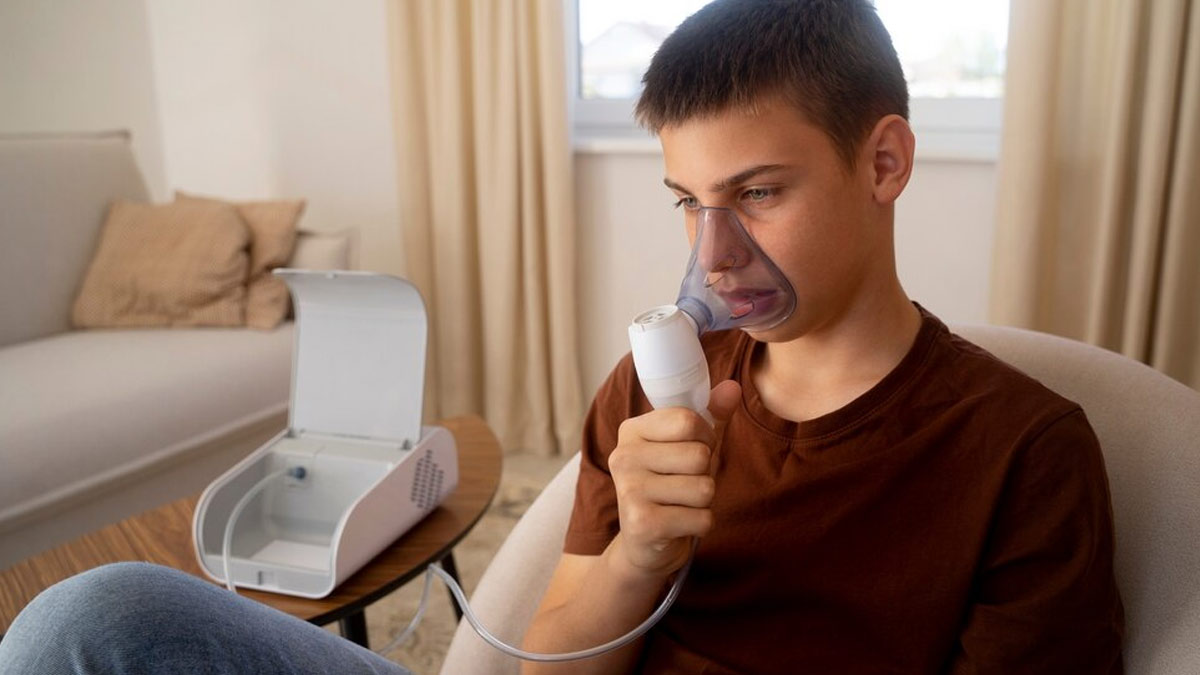
Did you know hot and humid weather can pose a potent asthma trigger? The global temperatures have been on a steady rise due to climate change. Breathing in hot air can trigger summer asthma symptoms, causing airways to tighten and narrow, making breathing difficult. We spoke to our expert Dr Praveen Kumar BS, Consultant – Pulmonology, Manipal Hospital, Yeshwanthpur, Bengaluru, who listed ways to manage asthma flare-ups in extreme heat.
Table of Content:-
Impact Of Hot and Humid Weather on Asthma

According to a 2023 study, extreme temperatures not only directly elevate the risk of asthma hospital admissions, respiratory symptoms, lung function deterioration, and airway inflammation, but also indirectly influence environmental interactions, thereby increasing the likelihood of asthma attacks.
“Elevated temperatures result in trapping of the greenhouse gases and worsen the ground-level ozone levels. Ozone or smog as it is otherwise called, is a potent lung tissue irritant and may cause respiratory issues even with minimal exposure. This may result in exacerbation of asthma symptoms”, said Dr Kumar.
Also, humid conditions promote the growth of mould and bacteria, which can further trigger asthma attacks. These environmental factors make it essential for those with asthma to take proactive measures to manage their condition, especially during periods of extreme heat and humidity.
Also Read: Here's How Heat Wave Worsens Your Asthma Symptoms
Six Steps to Prevent Flare-Ups in Extreme Heat

Be Prepared for Weather Changes
“Monitoring weather changes and taking necessary precautions is one of the most effective ways to prevent asthma flare-ups during hot and humid weather”, said Dr Kumar. Always check the temperature, air quality, and pollution levels before going outside. It is recommended to limit your outdoor activities to reduce exposure to potential asthma triggers.
Plan Activities Wisely
Timing is crucial in the management of asthma flare-ups during outdoor activities. Plan your outdoor activities in the morning when temperatures and air quality are generally better.

Stay Cool and Hydrated
Staying cool and well-hydrated greatly helps manage asthma during hot weather. Maintaining adequate hydration by drinking small quantities of water throughout the day helps thin the mucus in your lungs.
“Regulate indoor temperature and humidity with dehumidifiers and air conditioners. It is advisable to maintain an indoor humidity level between 30-50%. Regularly changing air filters in your HVAC and air filtration systems can also help maintain healthy indoor air quality by removing potential irritants”, said Dr Kumar.
Also Read: Intrinsic Vs Extrinsic Asthma: Expert Explains Symptoms, Causes, Diagnosis, And Treatment
Keep Medication Accessible
Asthma symptoms can flare up unexpectedly. Therefore, always keep your maintenance (controller) and quick-relief (rescue) medications handy. Do not skip your asthma medications or miss the prescribed doses, even if you feel well. Discuss an asthma action plan with your healthcare provider to be well-prepared for unwarranted flare episodes.
Maintain a Clean Environment
Keep your home and surroundings pollutant-free to prevent asthma triggers. Regularly clean your living areas to reduce exposure to dust, mould, allergens, and other potential irritants.
Be Prepared for Power Outages
Extreme heat can sometimes lead to power shortages, which can be particularly challenging for those with asthma who rely on electrically powered medication delivery devices. Discuss with your healthcare provider about using medication delivery devices that do not require electricity, such as inhalers versus nebulisers. Ensure that you have a sufficient supply of medicines to last through any potential disruptions.
Message From The Expert
Dr Kumar concluded, “Climate change that has resulted in hot and humid weather presents unique challenges for individuals with asthma. It is essential to take proactive steps to manage the condition. By monitoring environmental conditions, planning activities wisely, staying cool and hydrated, keeping medication accessible, maintaining a clean environment, and being prepared for power outages, those with asthma can reduce the risk of flare-ups and manage their symptoms more effectively.”
[Disclaimer: This article contains information provided by an expert and is for informational purposes only. Hence, we advise you to consult your expert if you are dealing with any health issues to get the necessary treatment.]
Also watch this video
How we keep this article up to date:
We work with experts and keep a close eye on the latest in health and wellness. Whenever there is a new research or helpful information, we update our articles with accurate and useful advice.
Current Version